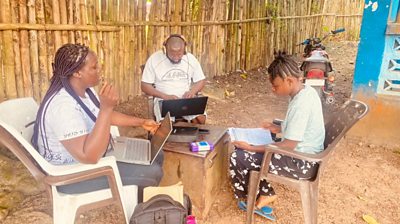Shaylim Castro Valderrama
Chevening scholar, BBC Media Action
The kekeh – a motorised three-wheeled vehicle – is a common sight on the streets of communities in Sierra Leone, where they are an important form of commercial transportation, and almost exclusively driven by men.
But journalist Sombo Angelina Fullah learned how to drive one in just three days – not to transport people or products, but to conduct interviews for Docket en Lappa, a 30-minute radio programme produced by BBC Media Action in partnership with Radio Wanjei in Pujehun, in the southern part of the country.
Now, Sombo and her kekeh have become a symbol for women in Sierra Leone, as a strong statement about what women are capable of.
Docket en Lappa – a Krio term for a purse worn with a wrapper, mainly worn by women – is part of the project Women Arise and Shine, funded by World Vision International. It’s aimed at promoting women’s participation in social, economic, and political space and rights.
“The programme is empowering women in terms of taking key decisions, being part of the women’s movement, of decision-making in their communities, their homes, and also where they live and how women can be financially empowered.”
— Marian Conteh, mentor and producer, BBC Media Action Sierra Leone
The weekly programme is recorded on a kekeh, where the presenter interviews female and male experts on topics that aim to support women to be more self-reliant, independent and able to make their own decisions. As background sound, the listeners hear the presenter riding on the streets and the kekeh’s engine.
The project is also hosting group listening sessions in four communities around the country, where neighbours gather together to listen to the programme.
In a male-dominated society such as Sierra Leone, where many people usually think women should be at home, the radio show is helping to slowly change that mentality.
“We ask questions [in these communities]. Sometimes when the women answer, they say ‘our leaders are not creating space for us’. Then we take those questions to the leaders,” Conteh says.

Docket en Lappa’s team in Sierra Leone
With 18 episodes planned before the project finishes next January 2024, the radio programme is beginning to shift societal expectations around women.
Now, Conteh says, people are aware of the importance of female representation when discussing topics related to their communities.
”When you see them in groups, you will hear them saying ‘I think we should be equal’. They find a way to include women to be part of meetings, or whatever engagements they are having,” Conteh said.
Having a kekeh play a central part in the radio programme came from a team brainstorm before the production started. The kekeh is a symbol of how women can ‘travel’ from one point to another –from not having confidence, to being braver, making decisions and having a say in what happens in their communities and families.
Adding to the symbolism is that women in Sierra Leone usually only see men riding a kekeh – and the kekeh is not yet common in some communities.
“But when they [women] see this kekeh, they want to get the experience of sitting in it. The kekeh is a symbol of a safe space where women can feel comfortable in discussing issues affecting their communities and also how they, as women, can take up decisions and make brilliant contributions to whatever is going on or happening in their communities,” says Conteh.
Docket en Lappa is part of the project Women Arise and Shine, funded by World Vision International and back-funded by the UN.
Source link : https://www.bbc.co.uk/mediaaction/where-we-work/africa/sierra-leone/dorget-en-lappa
Author :
Publish date : 2023-12-18 19:42:09
Copyright for syndicated content belongs to the linked Source.





